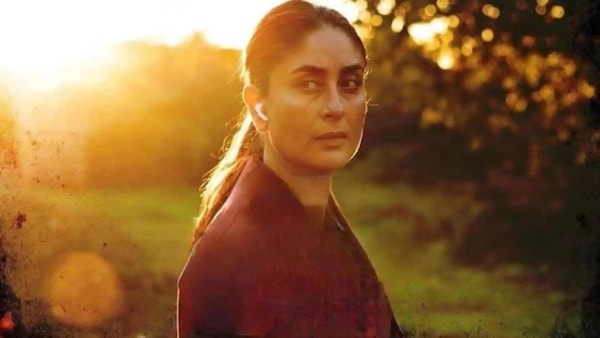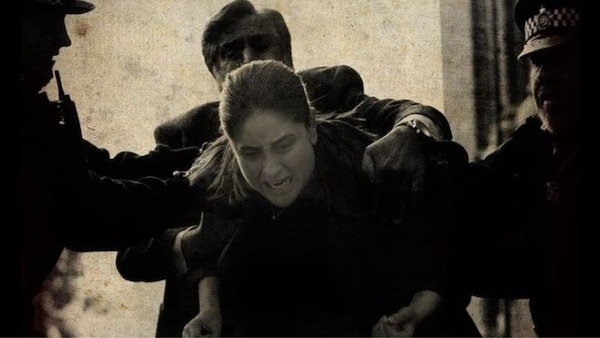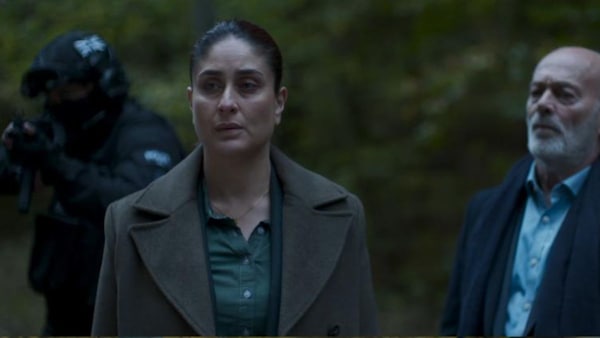The Buckingham Murders: Kareena Kapoor Khan Leads From The Front
In his first murder mystery, filmmaker Hansal Mehta crafts an intricate web of biases, underlining everyone’s vulnerability to it, including and mainly his protagonist played by Kareena Kapoor Khan.

Promo poster for The Buckingham Murders.
Last Updated: 04.59 PM, Sep 13, 2024
TWO DECADES into her career, Kareena Kapoor Khan wants to be known as an actor. The desire is belated, if not misplaced. Most actors share this intent at the onset till they are seduced by trade and numbers. On the contrary, Khan’s early filmography is dotted with tentpole outings where her presence was prioritised over the roles. The fact that those are still counted as professional triumphs proves that she turned being an accessory into an art form. Hansal Mehta’s The Buckingham Murders, however, is a compelling portrait of her skill and commitment to this transformed phase, much like Sujoy Ghosh’s Jaane Jaan (2023). Except, it tries to align with the trappings of her stardom which Ghosh’s film did not.
In High Wycombe, a 10-year-old Sikh boy is found dead in a car and a Muslim teenager from the neighbourhood is arrested. Communal tension escalates in the town as the cops try dowsing the agitation. Handling the case is Jasmeet Bhamra (Kareena Kapoor Khan), a newly posted detective who is mourning the hate-killing of her child.
Mehta’s The Buckingham Murders, marking his first foray into murder mystery, unfolds largely as a fuss-free procedural drama. What comes close to its undoing is the film’s sporadic awareness of being headlined by a mainstream star. Compromises are evident: the background score is consistently amped up (which single-handedly comes closest to ruining certain scenes), nondescript songs are thrown in and the camera stays firmly on Khan’s unvarnished face, as if baiting her to have a breakdown and teleporting us to the many iterations of it we have witnessed in the past. There is a telling scene when she almost gives in. The actor lets out an anguished cry in the dead of the night but her ‘performance’ comes to a quick halt when a complaint comes shooting from the other side: “Let us sleep”.

The film is effective when Mehta imbues the narrative with his distinct style. A stray incident of murder becomes an entry point to inspect communal faultlines. When Ishpreet Kohli’s body is discovered and arrests are made, violence breaks out in the town. It is a familiar sight. The day Jasmeet aka Jazz arrived at High Wycombe, a cricket match had led to a similar eruption. Investigations lead to murky details. Ishpreet Kolhi, the kid who died, and Saquib Chaudhary (Kapil Redekar), the boy accused of the murder, knew each other. Their fathers were business partners. During the pandemic, they incurred losses which led to the end of the partnership and a rise in animosity. Detective Inspector Hardik Patel (Ash Tandon) believes this to be the motive for the murder although Jazz, his subordinate, points out there are discrepancies.
The filmmaker does something familiar here. He uses the volatile political rhetoric prevalent in India today, and shifts its context to the UK, much like what he had done in Faraaz (2022) where questions about religion and religious extremism were raised through a terror attack in Bangladesh. If the subtext is not blunted by translation it is because Mehta does not lose sight of the story he wants to tell. The incident is strategically placed even when no year is mentioned. It is a post-Covid world and the air is rife with fresh wounds and misinformation about superspreaders. The communal strain is present even when invisible. When Daljeet Kohli (Ranveer Brar) is told about Saquib’s alleged involvement in his son’s murder, he stings with, “You believe it or not, their community is dirty”. When the cops arrive outside a mosque to interrogate Saquib’s uncle, everyone around him becomes vigilant like it is a regular happening, and when DI Hardik Patel arrests Saquib, his words are, “Got you this time” like nabbing the teenager was a longstanding plan. A harmless cricket match leads to killings. The Buckingham Murders unfolds not just as a metaphor for what is happening in India today but as an exposition of what the happenings in India are doing to the people elsewhere.

The nuance of such a gaze enriches other readings. Like a patriarchal man, prone to belittling his wife, displaying genuine sorrow over the loss of his adopted child. The reason hits later. His love was tied to the gender of his offspring. Ditto for Hardik Patel, a sexist bigot, harbouring resentment towards Saquib. A personal reason is furnished but the suspicion still stands on its own feet. In his first murder mystery, Mehta crafts an intricate web of biases, underlining everyone’s vulnerability to it, including and mainly Jazz.
Written by Aseem Arrora, Raghav Raj Kakker and Kashyap Kapoor, The Buckingham Murders infuses its lead character with a quiet heroism that simmers without exploding. She is not the one who defies the orders or breaks the system. She takes a desk job when told and only confronts when a boy’s life hangs in the balance. When questioned, Jazz says she knows it in her gut. The assumption here is that being a mother she is more attuned to the incident, that motherhood is her superpower. And yet the twist Mehta reserves at the end (poorly staged and acted) thwarts this belief. In many ways, the intrigue of the film lies less in the revelation and more in the execution. In a story where two hate crimes take place, the filmmaker flattens generalisation to underscore a sobering thought: not all Muslims and not all mothers.
